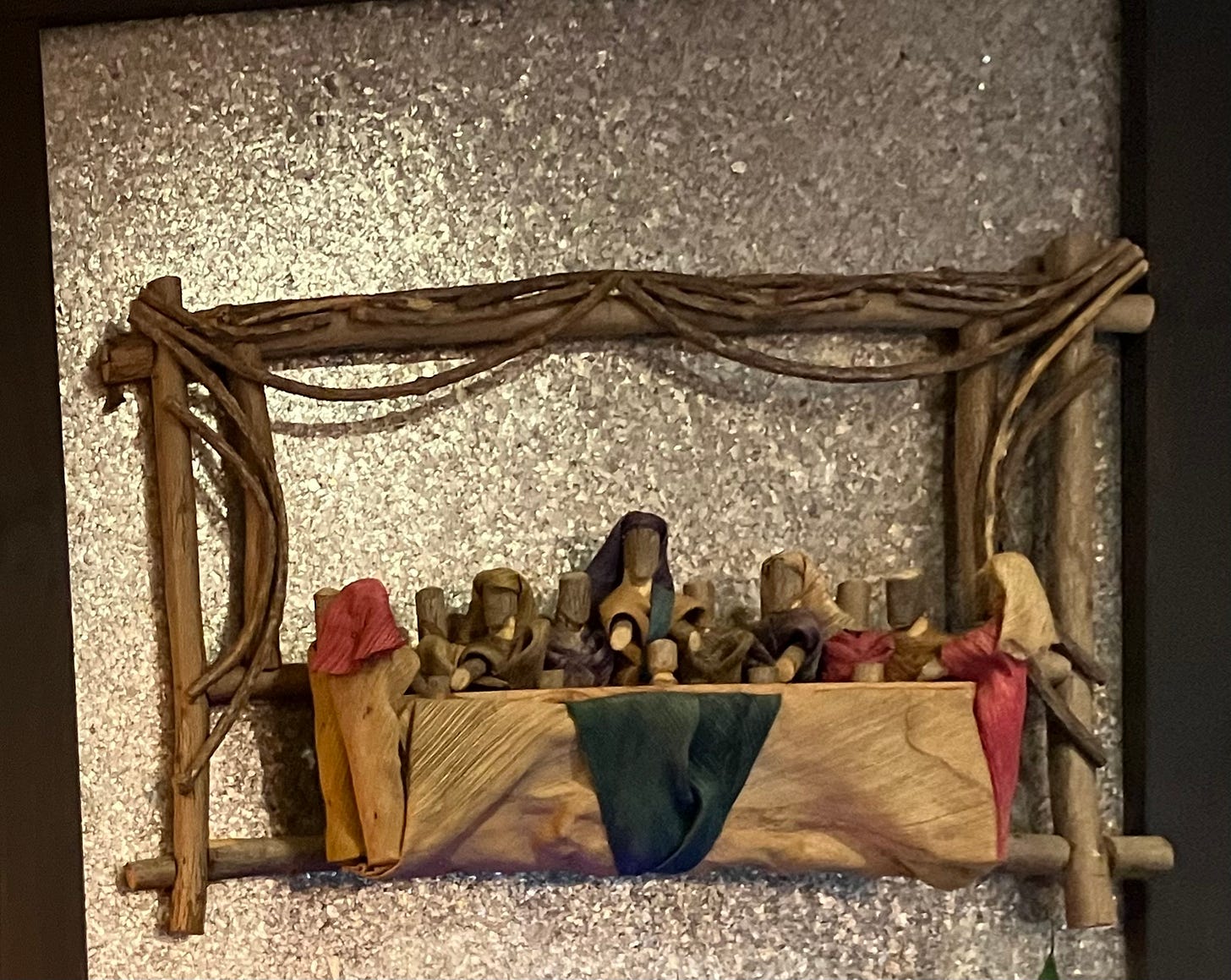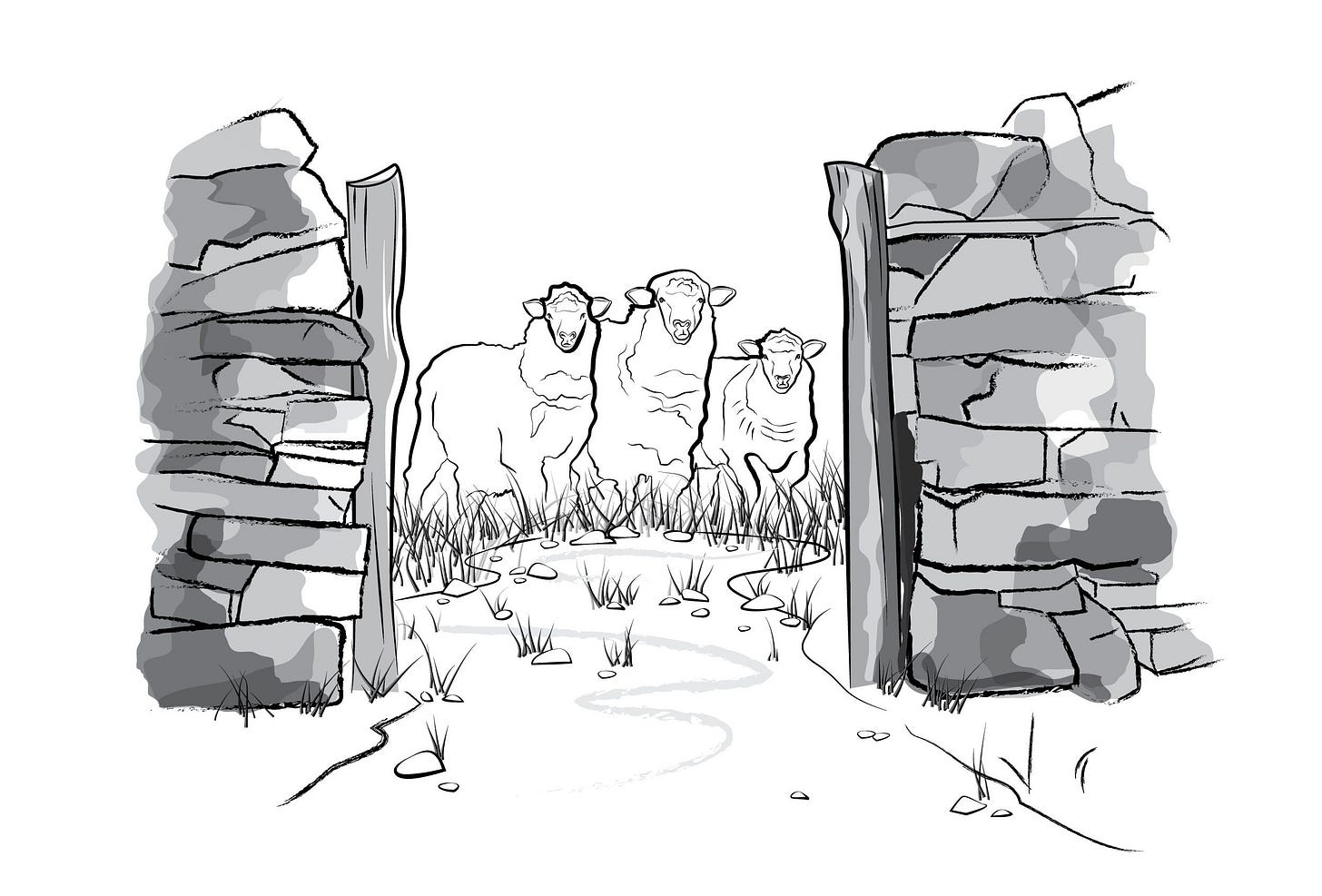The Gate & The Table
Unwinding this week's parables
Dear Friends,
Tis the season for parables! Also for Luke’s preoccupation with meals.
I’ll be honest, I prefer the parables.
Food is one of those things I am rigid about, and not only just in the years since I developed dozen odd allergies. Once, offered samples at a Costco while shopping with my mother, I looked at her with frustration and distress and declared “I don’t eat public food!”
It was a peculiar phrasing, but true nonetheless. The single summer coffee hour my mother and grandmother would host each year (we attended early service, which didn’t have a coffee hour during the main program year) was my least favorite Sunday of the entire year. I love to feed people, but I continue to have a lot of complicated hangups about what and when and where I eat.
And with who. That too, so I find the Pharisees deeply relatable in this week’s Gospel when they find themselves looking at Jesus’s dinner company in judgement. Though the ‘with who’ is not my greatest hangup, it’s definitely a concern. And that’s without the burden of clear social rules – because I like rules. I like them a little more than average and I have plenty of my own peculiar internal ones. Plus, there’s no rule I can’t have dinner with my wife’s classmates when two more people get added to the plans at the last minute, but the fact is that I can’t.

Anyway, I get it. The Pharisees were doing their best. They knew the rules. They weren’t saying you needed to starve the tax collectors or other “sinners,” just that eating alongside them was not how things were done. Why shake things up?
And When The Missing Sheep Is Found…
Jesus, of course, shakes things up and does so joyously. This isn’t news to any of you reading this. But the parables he calls upon to describe why can seem a bit askew. They depend, I would suggest, on some other things that Jesus has said along the way.
To take a step a bit sideways, a note about a distinctive Godly Play thing. If you aren’t deeply familiar with one of our curricular quirks, Godly Play doesn’t begin exploring any given story by focusing on the particulars of one version. So, specifically when it comes to multiple similar stories told across the Gospels or different versions of the same story, Godly Play merges those core details.
Because of this, in the Parable of the Good Shepherd, we hear not just about the Good Shepherd who knows the sheep and protects them from the wolves, but also about the Shepherd who seeks out the lost sheep and then celebrates its recovery. Occasionally, someone will point this out in a training. It’s true. Plus, we don’t have any of the other “lost stuff” stories like the Parable of the Lost Coin also told in this week’s passage from Luke.
What’s the deal with the lost sheep and the lost coin and these meals with the tax collectors and all that? What do they have to do with each other? We have to fill in some blanks around the conclusion of the text: “Just so, I tell you, there is joy in the presence of the angels of God over one sinner who repents."
The hope here, clearly, is that, through their encounter with Jesus – including at these meals – that these sinners will repent. They will be found, recovered like the lost sheep or the coin. The same remains true today, in our encounters with the Gospel, with Jesus in the Eucharist, in each other, and in all of these iterations we are reminded of one of Jesus’s other sayings.
Yes, he said “I am the Good Shepherd” but Jesus also said, “I am the Door” (John 10:9, also translated as the Gate). In order to pass into the Kingdom, to Repent, to be Found, the sinner must go through the door.
The Gate & The Good News
When I was young, I had an occasionally repeating dream that included the gate in my grandparents’ garden. In real life, that was the gate between the garden and the side driveway on the other side of what had once been a functional plant nursery (so, practically speaking, it was about 2 houses away and around the corner from their house, but instead of other houses, there was just garden). In my dreams, though, I would run through that gate, running away from something frightening, and be somehow transported some great distance, usually about a mile or so back towards my house or my elementary school but sometimes to someplace more mysterious. The gate had power.
There is a similarly strange leap, a transportation that takes place, from Jesus eating with sinners to his parabolic conclusion that the angels rejoice over one sinner who repents over the 99 holy men who remained faithful. If Jesus keeps eating with those who already know and follow him, nothing changes. If he follows the rules, nothing changes. Things only change when we open the door or unlatch the gate.
So sure, I love a rule. And I understand why the Pharisees and scribes were scandalized. But no one was going to be saved through them. It didn’t matter who they invited to the table. None of us, as witnesses to the Gospel, can say the same thing.
It’s that time of year when many of us are hard at work reminding children about the virtues of kindness. About sitting with the child who is alone at lunch or inviting them to play. These are the small openings, the basic moral goods that are also lived articulations of our faith. But it’s also a good time to remember what it felt like when someone showed up that kindness, that invitation, to us.
I wonder when someone has invited you to the table when you really needed it? I wonder what their kindness told you about God?
A Prayer
God of many names: Good Shepherd, Light of the World, True Vine, the Gate – you make yourself known to us in countless ways. Help us to be manifestations of your names, even in our ordinariness, sharing light and food and pointing the way, that we may draw closer to you by inviting others to the table. We ask this guidance in right action through your many names, in your unity, eternal three-in-one. Amen.
Resource Round-Up
I hope everyone is steadily getting back into their routines. It is unbelievably already the second week of September, so it will be the Feast of St. Francis before you know it!
Previous reflections on the Feast of Francis:
And don’t forget about the free St. Francis lesson from Holy Troublemakers & Unconventional Saints.
Keeping with some animal themes:
My good friend showed me Ten Nesting Sparrows: A Biblical Counting Book that just came out last week and it’s so sweet! Just an excellent board book full of Bible birds and their associated verses.
It’s not too late to order a St. Francis bird balancing game from Shining Light Dolls or the very cute little St. Francis doll.
On some different notes:
I really appreciated this article from The Walrus on “Obstacle Parenting.” It’s a good reminder that, as adults, our job is not to smooth out the obstacles in front of children, but rather to help children cultivate the focus, determination, and skills needed to navigate those barriers themselves. A few weeks ago, we had the Gospel reading where Jesus reminded us that loving parents give their children good things, and appropriate opportunities to try and fail and try again are in fact a good thing.
Meredith Miller has an updated list of all her Bible story guides available here. It accidentally went out behind a paywall at first, so if you got it by email but couldn’t see much, here’s the full link.
Running a lot of orientation meetings or trying to get youth to talk to you? These "Magical Questions for Formation Gatherings” are a combination of silly and deep, cultivating intimacy without pushing too hard into discomfort.
That’s it for this week! I’m so excited to be getting back into the usual routines in my life and I’ll “see you” all next week.
Peace,
Bird



